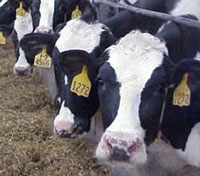The ethanol co-product distillers grains offer a way to supplement bad hay being baled for winter feed this year.
 During field days this month at University of Missouri Forage research centers, extension regional livestock specialist Chris Zumbrunnen told participants that distillers grains, which offer up to 30 percent protein, can pick up the slack when the hay quality falls short. “There is a tremendous amount of high quality product available,” Zumbrunnen said. There will also be plenty of poor quality hay that was harvested late and rained on during haymaking.
During field days this month at University of Missouri Forage research centers, extension regional livestock specialist Chris Zumbrunnen told participants that distillers grains, which offer up to 30 percent protein, can pick up the slack when the hay quality falls short. “There is a tremendous amount of high quality product available,” Zumbrunnen said. There will also be plenty of poor quality hay that was harvested late and rained on during haymaking.
Zumbrunnen explained that different types of distillers grains require different handling methods.
 The dried product, known as DDGs, which has only 10 percent moisture, handles and stores easily but it can draw moisture and become caked in storage. “If you put it in a bin, you might have a hard time getting it out,” Zumbrunnen said. The wet product, with 65 percent moisture, is less expensive, but needs to be used quickly. “It’s tough to store and do anything with,” he said. “You can’t stack it, as it will spread out unless contained.”
The dried product, known as DDGs, which has only 10 percent moisture, handles and stores easily but it can draw moisture and become caked in storage. “If you put it in a bin, you might have a hard time getting it out,” Zumbrunnen said. The wet product, with 65 percent moisture, is less expensive, but needs to be used quickly. “It’s tough to store and do anything with,” he said. “You can’t stack it, as it will spread out unless contained.”
A new modified wet distillers grain offered by some ethanol plants allows more flexibility and ease in feeding. The modified product is dried down to 50 percent moisture. It retains its shape and won’t blow away like dry product. ”The modified wet product can be fed on the ground or on top of unrolled baled hay. It stays in place,” Zumbrunnen said “Those old cows love it.”
The best time for herd owners to buy distillers product is in late summer, before demand picks up from the feed yards. “You can save $30 a ton by buying in the off season,” Zumbrunnen said. “Now is the time to buy if you can store it.” A list of prices and sources for distillers grains in Missouri is updated weekly and listed on the dairy feed page of the MU AgEBB.
